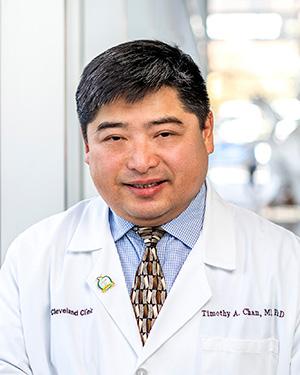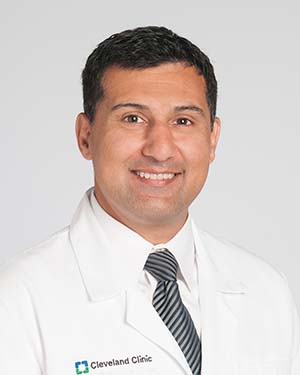Research News
09/23/2022
Cleveland Clinic Receives $7.9 Million Grant from NIH to Form Radiation Oncology-Biology Integration Network (ROBIN)
Precision cancer medicine is the goal of a new multidisciplinary study, led by Dr. Tim Chan, examining radiation therapy combined with targeted therapy

Cleveland Clinic received a five-year, $7.9 million grant from the National Cancer Institute at the National Institutes of Health (NCI at NIH) to form one of three national centers as part of the newly established Radiation Oncology-Biology Integration Network (ROBIN).
Timothy Chan, MD, PhD, Chair of the Center for Immunotherapy and Precision Immuno-Oncology at the Lerner Research Institute, will serve as the primary investigator of Cleveland Clinic’s ROBIN center, which will research the molecular mechanisms and biology of radiation therapy response, and the timing and treatment efficacy of radiation-based combination therapies for cancers of the bladder, head and neck.

“Radiation therapy is a bedrock of cancer treatment, with about two out of every three patients with cancer receiving it,” says Dr. Chan. “Yet, despite its widespread use, our understanding of the molecular mechanisms and biology of radiation response remains poor. The ROBIN center will allow us to better understand why certain forms of radiation therapy are successful in certain settings, and why some mechanisms give rise to resistance.”
In partnership with Emory University, a multidisciplinary team of Cleveland Clinic researchers and clinicians will lead the study, with the goal of developing new cancer treatment approaches by improving our understanding of the drivers of efficacy in radiation-based therapies. Specifically, the team will study radiotherapy in combination with antibody-drug conjugates and immune checkpoint inhibitors.
Accelerating Discovery to Enhance Patient Care
Cleveland Clinic’s unique bench-side to bedside patient care model facilitates multidisciplinary collaboration across institutes and research labs. By seamlessly integrating clinical trials with basic science, researchers and clinicians can accelerate discoveries that ultimately lead to better patient care.
“Precision cancer medicine is the future of cancer care,” says Dr. Chan. “The ROBIN center harnesses the power of Cleveland Clinic’s translational research strengths and world-class patient care, where we have the ability to continually learn from innovative treatment techniques by bringing findings back to the scientific bench for further examination, and then sharing our discoveries with clinicians to expand frontiers in patient care.”
A multidisciplinary collaboration of researchers and clinicians from the fields of radiation oncology, radiation biology and radiation physics research will allow for seamless sharing of information. In addition, the creation of a cross-training workforce development program will help build a pipeline of scientists in radiation biology, radiation physics and clinical radiation oncology.
The ROBIN center will draw upon Cleveland Clinic’s rich patient care volumes to generate molecular data on the mechanisms of action, drivers of resistance and tumor evolution in patients treated with radiotherapy, in combination with antibody-drug conjugates and immune checkpoint inhibitors.
Omar Mian, MD, PhD, a radiation oncologist at the Taussig Cancer Institute and researcher at the Lerner Research Institute, will lead one of the molecular characterization trials focusing on the combination of a targeted therapy, sacituzumab, plus radiation, for the treatment of bladder cancer. A cohort of this study also will take place at Cleveland Clinic’s Florida Research and Innovation Center, under the leadership of Anatoly Nikolaev, MD, PhD.
“The future of cancer care is predicated on being able to better select the best treatment for each patient,” says Dr. Mian. “The ROBIN trial will create the data needed to ultimately drive precision cancer medicine that, in the end, provides the best outcomes for each patient and helps improve quality of life.”
A second clinical trial examining the effectiveness of treating recurrent head and neck cancer with radiation therapy and anti-PD1 therapy, nivolumab, is being led by Shlomo Koyfman, MD, a radiation oncologist at the Taussig Cancer Institute.
“Preliminary results are promising,” says Dr. Koyfman. “The addition of immunotherapy to intensity- modulated radiotherapy (IMRT)-based reirradiation is yielding two-year survival outcomes that appear to outperform our historical rates.”
De-identified patient samples from those receiving the current standard of care and those in the clinical trials will be collected and stored at the Cleveland Clinic BioRepository, a 22,000-square-foot facility on Cleveland Clinic’s main campus that is managed by Azenta Life Sciences and facilitates seamless precision-medicine biobanking through sample collections, transport and integrated tracking.
The samples will be carefully analyzed by Dr. Chan’s lab to generate data using multiple orthogonal analytical strategies, including genetic sequencing, RNA sequencing, immune and microenvironment analysis, tumor evolutionary dynamics and gene expressional reprogramming modeling. The breadth and depth of data generated will reveal the most comprehensive insights into radiation-based cancer treatment strategies to date.
“A variety of experts collaborating on the best way to advance cancer medicine perfectly captures the essence of Cleveland Clinic,” says Dr. Mian. “Innovation, discovery, integration of science and medicine – these are the driving factors that lead to providing our patients the best possible care, outcomes and quality of life.”
This study is funded in part by study sponsors, Varian and Gilead Sciences, and Brian and Diana Taussig.
Featured Experts
News Category
Related News
Want To Support Ground-Breaking Research at Cleveland Clinic?
Discover how you can help Cleveland Clinic save lives and continue to lead the transformation of healthcare.
Give to Cleveland Clinic
